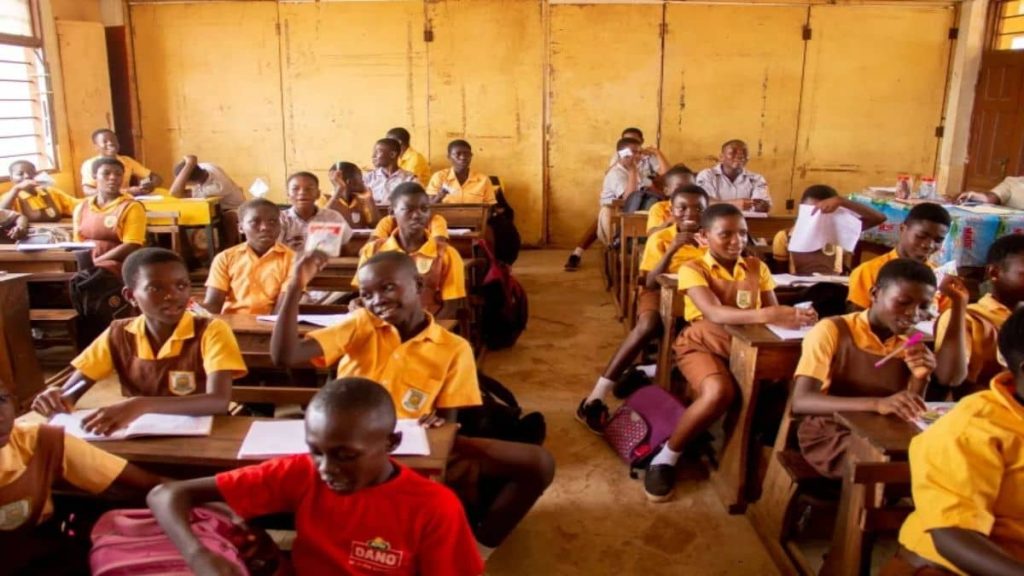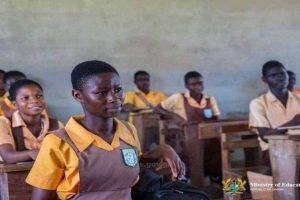MoE limits use of local language for teaching to KG and primary 3

The Ministry of Education (MoE) says the use of local language or mother tongue language directed by the Minister for Education, Haruna Iddrisu, to be used for teaching at the pre-tertiary basic level, applies to Kindergarten and lower primary students.
Speaking at the launch of the Foundational Learning Action Tracker at the Accra College of Education on Monday, October 27, Dr Clement Apaak clarified that the directive applies only to the early years of education and not to the entire basic school system, as had been reported in some media outlets.
“The Honorable Minister for Education, Haruna Iddrisu, has asked me to clarify that the policy directive he announced on Friday regarding the compulsory use of mother tongue as a medium of instruction in our public basic schools is confined, emphasis, confined to KG up to primary three. In other words, KG and lower primary,” he said.
The Deputy Minister said the clarification is aimed at ensuring the smooth implementation of the language policy and preventing misinterpretations that could disrupt effective teaching and learning across different grade levels.
The clarification comes after the Minister of Education, Haruna Iddrisu, has directed the Director-General of the Ghana Education Service (GES), Professor Ernest Kofi Davis, to make local language compulsory for teaching or instruction in all pre-tertiary schools across the country.
The Education Minister made the announcement on October 24, 2025, at the Accra College of Education during the launch of Free Tertiary Education for Persons with Disabilities, a huge step for inclusive learning.
Speaking at the launch of the Free Tertiary Education for Persons with Disabilities in Accra on Friday, October 24, 2025, Mr. Iddrisu said the new directive takes immediate effect under the supervision of the Ghana Education Service (GES).
The Minister in Charge of Education said the decision to use local languages for teaching is aimed at removing the language barrier in education and improving learning outcomes at the basic level, and helping children understand lessons better in the languages they speak and know.
He explained that a child learns best in a familiar language and that it is unfair for Ghanaian children to begin their education entirely in English when they come from homes where local languages are spoken.
“The story is told of a young girl whose teacher was teaching in English at an early stage, and the child struggled to understand. That child was not born into an English family but a proud Ghanaian family. Every Ghanaian child deserves to learn in a language they understand,” the Minister said.
The Minister for Education indicated that the Ghana Education Service will ensure strict enforcement of the policy to make sure every teacher at the basic level uses the appropriate Ghanaian language of instruction.
Mr Haruna Iddrisu added that the move forms part of President John Dramani Mahama’s broader agenda to promote inclusivity and improve the quality of education in Ghana.
The Minister commended President Mahama for his commitment to making education accessible and equitable for all, noting that the government continues to prioritize both basic and higher education development in the country.
“President Mahama is fulfilling his promise of inclusivity and equal opportunity in education. His vision is to make learning meaningful for every Ghanaian child, regardless of background or ability,” he said.
Meanwhile, a Senior Lecturer at the University of Cape Coast’s Department of Basic Education, Dr. Joyce Tawiah-Mensah, has urged the government to demonstrate strong political commitment to ensure the effective implementation of mother tongue instruction in Ghanaian schools.
Reacting to the directive on the Citi Breakfast Show on Monday, October 27, Dr. Tawiah-Mensah commended the initiative but stressed that its success would depend on the government’s readiness to provide the necessary resources and teacher capacity.
“It’s something that we can do, but we need political commitment in terms of teacher training, materials, and others,” the University of Cape Coast Senior Lecturer suggested.



